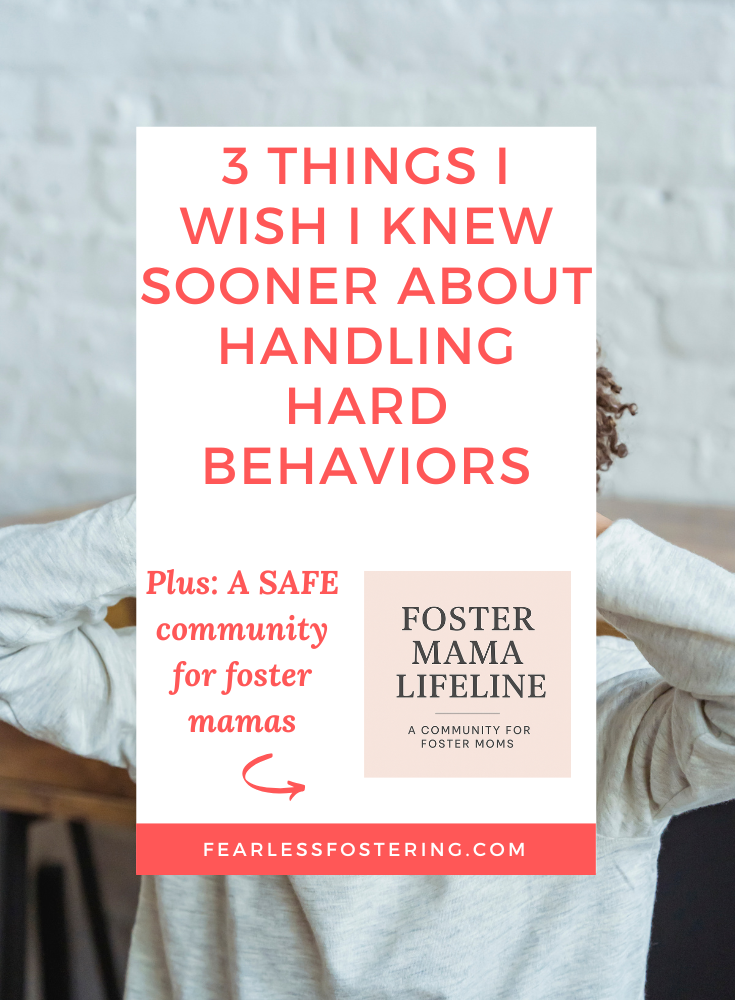
When I first started parenting kids from hard places, I thought I was prepared.
I had read the books.
I had attended the trainings.
I had even practiced my calm voice in the mirror (true story).
But nothing fully prepared me for the moment I was in the middle of a screaming match with a 6-year-old who had flipped a table over, while my heart was racing, my voice was shaking, and I was thinking,
“What am I doing wrong?”
The truth is, nothing. I wasn’t doing it wrong—I just didn’t know what I know now.
If you’re navigating frequent meltdowns, power struggles, or total shutdowns, you’re not alone. These behaviors can feel overwhelming and even scary at times. And most of us were never taught what to do with them—especially in the context of trauma.
So today, I want to share with you the 3 things I wish I knew sooner about handling hard behaviors. These lessons have completely shifted how I show up as a foster mom and a therapist—and they might just do the same for you.
1. It’s Not About Me—It’s About Their Nervous System
In my early days as a foster mom, I took everything personally.
-
The refusal to follow directions? “They’re testing me.”
-
The screaming fit over the wrong color cup? “They’re being manipulative.”
-
The meltdown after a calm conversation? “I must have triggered them.”
But here’s what I didn’t understand yet:
Hard behavior is often just a dysregulated nervous system doing its best to survive.
When a child has experienced trauma—whether that’s abuse, neglect, abandonment, or chronic instability—their brain gets wired to expect danger. That means their “fight, flight, freeze” response is on high alert all the time, even in safe environments.
So when they throw things, yell, or shut down, they’re not trying to be difficult.
They’re trying to feel safe again.
Once I truly understood this, my entire mindset shifted. Instead of reacting from a place of frustration, I could pause and ask:
“What is their nervous system experiencing right now?”
“What do they need in this moment to feel safe?”
This doesn’t mean I condone the behavior—it just means I respond from a place of compassion and regulation instead of control.
What I Wish I Knew Sooner:
Behavior is not the enemy. Dysregulation is. And my job isn’t to fix it—it’s to meet it with presence, calm, and safety.
2. My Regulation Matters More Than My Reaction
I used to think the key to managing hard behaviors was saying the “right thing” in the heat of the moment.
I had memorized calming scripts like:
-
“I can see you’re upset.”
-
“I’m here to help.”
-
“We’ll get through this together.”
But here’s the thing: I could say all the “right words,” but if I was internally dysregulated—if my body language, tone, or energy said otherwise—none of it landed.
Kids are experts at sensing emotional safety. They don’t respond to what we say as much as they respond to what we feel.
And if I was anxious, tense, or emotionally flooded—even behind a calm voice—they felt it.
What changed everything for me was learning how to regulate myself first.
That meant:
-
Pausing before responding
-
Taking deep breaths or grounding myself with touch (hand on heart, cold water, etc.)
-
Checking in with my own nervous system before trying to co-regulate someone else
When I started showing up as a calm, safe presence, my kids’ behaviors didn’t magically disappear—but they de-escalated faster, and we recovered from them more quickly.
What I Wish I Knew Sooner:
It’s not about saying the perfect thing. It’s about being the regulated anchor they can trust to ride the storm.
3. Repair Is More Important Than Getting It “Right”
If I could go back and hug early-foster-mom me, I’d tell her this:
You are going to mess up. And that’s okay.
I thought handling hard behaviors meant always staying calm, always being in control, and always having the right response.
Spoiler alert: that’s not possible.
We’re human. We get tired. We say the wrong thing. We raise our voices. We freeze. We react.
But here’s the gift: repair matters more than perfection.
When I mess up—and I still do—I’ve learned to lean into repair. I’ll say something like:
-
“I lost my cool earlier, and I’m really sorry. That wasn’t your fault.”
-
“You were having a hard time, and I wasn’t as calm as I wanted to be. Can we try again together?”
-
“I love you. Even when things are hard. Especially when they’re hard.”
Repair teaches our kids that:
-
Conflict is normal
-
Relationships can survive mistakes
-
They’re still loved, even when things get messy
It also models emotional responsibility in a way they may have never seen before.
What I Wish I Knew Sooner:
There’s no such thing as getting it perfect. There’s only showing up, making repairs, and growing together.
Why This Matters Now
You might be reading this while feeling completely drained by the emotional weight of the behaviors you’re dealing with every day.
And I want to say this, as clearly as I can:
You are not doing it wrong.
Hard behaviors don’t mean you’re failing.
They mean your child is struggling.
And you’re the safe adult who is showing up in that storm again and again.
That is powerful. That is sacred. That is enough.
And the more tools, support, and confidence you have in those moments, the easier it becomes to hold space without burning out.
Want ongoing support from someone who gets it?
The Foster Mama Lifeline is a safe, judgment-free space where you’ll get weekly encouragement, practical tools, and connection with other foster and adoptive moms who understand the emotional weight of this work.
You don’t have to carry this alone.
+ show Comments
- Hide Comments
add a comment